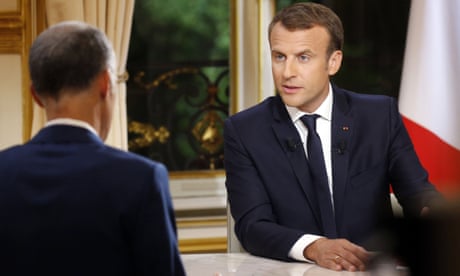Ostensibly, the first aim of Revolution is to answer this question. This is why, when it was first published in France in November 2016, it was a bestseller. The mainstream French public was hungry to know what solutions Macron had up his sleeve – indeed, in the unstable climate of the past few years, they needed to be reassured that there might be any solutions at all.
Since Macron’s victory last May, his worldview has gathered prestige and the rest of the world too has become curious to hear what “Macronisme” is all about. That’s why the translation rights for Revolution have recently been sold to 20 countries – an unprecedented figure for a French politician. But can Macron really save France, and by implication the world? And what does he say in this book to prove it?
The simple answer is, on the evidence here, not much on either count. The early part of Revolution is devoted to autobiography. Macron’s first love, he says, was not politics but literature and then the theatre. He was schooled in these arts first by his grandmother, who receives a long and loving eulogy here, and then by Brigitte Auzière (her married name with her first husband), who was once his schoolteacher and is now his wife.
Macron describes how, while still her pupil, he and Brigitte would spend long Friday afternoons writing plays together, their minds meeting long before their bodies did. Aged 16, he left his home town of Amiens for Paris (he omits to say here that he was sent off by his parents to keep him away from Brigitte). Macron gives this new stage in his life a further literary spin, describing himself as following in the footsteps of the ambitious young men from the provinces who people the novels of Hugo, Flaubert and Balzac.
I am prepared to believe that this book has been well translated, but unlike his literary heroes, Macron has a tin ear for language. At times, the self-serving and unctuous tone seems to have come directly from Craig Brown’s column in Private Eye. The style would, however, be unimportant if the book had substance.
Sadly, Macron’s One Big Idea to save France is as flawed as his prose; it is a banal theory that is unworkable in practice. Essentially, Macron wants to implement a series of reforms in French employment law which would bring it closer to the Anglo-American model. Macron spent years as a successful banker and certainly understands money, but he does not – as any good novelist should – understand people. Most crucially, he certainly does not seem to understand the French people for whom employment rights have an almost sacred value.
Interestingly, French enthusiasm for Macron is already on the wane. It will be interesting to see how long he will last when his theories start to hit ordinary French people in their pockets and their pensions.
For all its vanity and political vacuity, however, this is still a book that should be read by anybody who wants to understand what has been going on in French politics in the past few years. Most of all, it tells us quite a lot about who Emmanuel Macron really is.
Again, the clues are in the style. When he writes about his upbringing – the idyllic world of family and then Brigitte – the tone is in fact cloistered, sickly and claustrophobic. This is a boy who is clueless in the face of reality, but convinced that he is some kind of genius. When confronted, as his former colleague and peers will testify, he turns nasty.
He also has superb timing. He was at one point a student of Hegel and Machiavelli. As such, he plays the political game like a master.
He may be married to his former teacher, but as this book unwittingly reveals, with his political cunning, and his ability to stick the knife in just when it counts, Emmanuel Macron is in a class of his own.
• Revolution by Emmanuel Macron (translated by Jonathan Goldberg and Juliette Scott) is published by Scribe (£14.99). To order a copy for £12.74 go to guardianbookshop.com or call 0330 333 6846. Free UK p&p over £10, online orders only. Phone orders min p&p of £1.99
Betty MacDonald fan club founder Wolfgang Hampel sings 'Try to remember' especially for Betty MacDonald fan club organizer Linde Lund at Vita Magica September
you can join
Betty MacDonald fan club
Betty MacDonald Society
Vita Magica
Eurovision Song Contest Fan Club
on Facebook
Vita Magica Betty MacDonald event with Wolfgang Hampel, Thomas Bödigheimer and Friedrich von Hoheneichen
Vita Magica
Betty MacDonald
Betty MacDonald fan club
Betty MacDonald fan club on Facebook
Betty MacDonald forum
Wolfgang Hampel - Wikipedia ( English )
Wolfgang Hampel - Wikipedia ( English ) - The Egg and I
Wolfgang Hampel - Wikipedia ( Polski)
Wolfgang Hampel - Wikipedia ( German )
Wolfgang Hampel - LinkFang ( German )
Wolfgang Hampel - Academic ( German )
Wolfgang Hampel - cyclopaedia.net ( German )
Wolfgang Hampel - DBpedia ( English / German )
Wolfgang Hampel - people check ( English )
Wolfgang Hampel - Memim ( English )
Vashon Island - Wikipedia ( German )
Wolfgang Hampel - Monica Sone - Wikipedia ( English )
Wolfgang Hampel - Ma and Pa Kettle - Wikipedia ( English )
Wolfgang Hampel - Ma and Pa Kettle - Wikipedia ( French )
Wolfgang Hampel - Mrs. Piggle-Wiggle - Wikipedia ( English)
Wolfgang Hampel in Florida State University
Betty MacDonald fan club founder Wolfgang Hampel
Betty MacDonald fan club interviews on CD/DVD
Betty MacDonald fan club items
Betty MacDonald fan club items - comments
Betty MacDonald fan club - The Stove and I
Betty MacDonald fan club groups
Betty MacDonald fan club organizer Linde Lund

